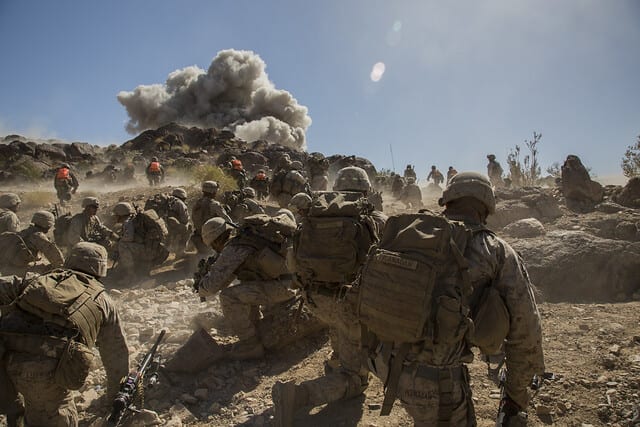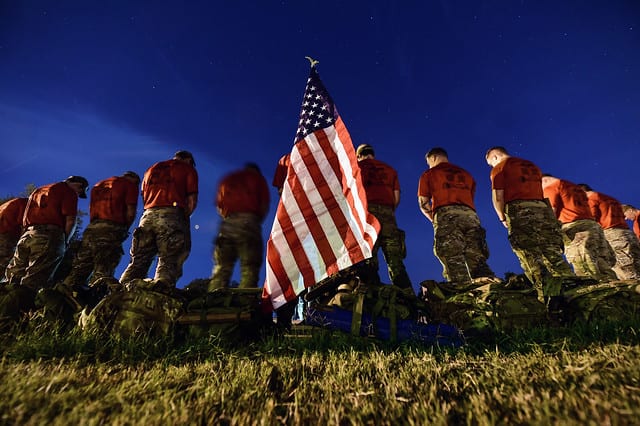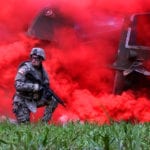The following excerpts come from Beyond Trauma by Dean Bonura.
…
Spiritual Trauma
Trauma affects a victim’s spirituality, assumptions about life, and how meaning, purpose, and significance are derived beyond typical social or institutional structures.5 When one’s spirituality is assaulted or disrupted, then those assumptions about life are shaken—or, in some cases, shattered. Ideas about what is good, meaningful, or worthwhile are questioned. This explains why sometimes trauma victims suffer from a crisis of faith: when they feel that God is responsible in some way for their trauma or when they blame him for it.
 Often those who lose faith in God also lose faith with their religious communities or with their families and friends, and as a result become isolated. These soldiers feel abandoned by God, conclude that he is irrelevant, or, worse, assume that he betrayed them.
Often those who lose faith in God also lose faith with their religious communities or with their families and friends, and as a result become isolated. These soldiers feel abandoned by God, conclude that he is irrelevant, or, worse, assume that he betrayed them.
Spiritual trauma is the effect of trauma upon a person’s sense of meaning, concept of self, view of God, or understanding of the nature of evil and suffering. Like any aspect of trauma, the extent of spiritual trauma depends on how the traumatic event is viewed by the victim. What is spiritually damaging to one victim may not be damaging to another victim who has gone through the same traumatic experience. The more threatening and damaging the effects of the event on an individual’s core spiritual values, the greater the spiritual trauma.
Imagine the symptoms of trauma are like an iceberg, having visible and less visible symptoms. People understand the nature of icebergs: most of their mass is below the surface of the water. What the human eye sees is only the “tip of the iceberg.” The real danger is below the waterline.
Clinicians usually address the visible symptoms of post-traumatic stress. These symptoms may include anger, sleeplessness, intrusiveness, hyperalertness, emotional numbing, dissociation, depression, and nightmares.
But there are symptoms that exist below the waterline. These symptoms might be grief, guilt, shame, anger toward God, alienation from him, and many forms of loss, such as loss of faith, loss of identity, and loss of meaning. These symptoms are spiritual in nature and require spiritual remedies. Some symptoms exist both above and below the waterline, requiring both clinical and spiritual intervention.
…
The Use of Spiritual Practices and Rituals
Prayer, meditation, and healing rituals are helpful in treating PTS.55 In research I did with combat veterans, warriors most often identified prayer as the preferred spiritual coping activity.56 Other productive forms of treatment include music therapy and guided imagery.57 I have used thematic music and videos as well as pictures that depict therapeutic concepts during group sessions, and soldiers have found them helpful.
 Healing services have been developed and used successfully in promoting reconciliation.58 Healing services are religious in nature and focus on confession, forgiveness, and reconciliation. They have been used to mark milestones in the treatment process or as celebratory events. They help soldiers in the way they communalize their trauma. Communalization happens when the community acknowledges its role in sending service members to war. It is the expression of the warrior’s experience within the larger, supportive community.
Healing services have been developed and used successfully in promoting reconciliation.58 Healing services are religious in nature and focus on confession, forgiveness, and reconciliation. They have been used to mark milestones in the treatment process or as celebratory events. They help soldiers in the way they communalize their trauma. Communalization happens when the community acknowledges its role in sending service members to war. It is the expression of the warrior’s experience within the larger, supportive community.
In a feasibility study conducted by several researchers, the daily practice of repeating a sacred word or phrase throughout the day moderated symptoms of PTSD among a small sample of veterans. They found a reduction of psychological stress, a reduction in symptoms, and an increase in quality of life.
In research conducted by Chaplain Steve Hokana, spirituality-based writing produced positive states among veterans suffering with PTSD, as opposed to writing that was not spiritually based.59
Spiritual healing can be found through confession. Confession is the admission of guilt. For many Christians, confession is an act of contrition that involves the sacrament of penance, of making amends for wrongs committed; it leads to reconciliation and absolution of sin. Veterans who are able to make things right with God and with offended parties are able to live with themselves. Some feel guilty for things they have done but without assigning the proportionate amount of guilt to others. They have carried a much too heavy and undeserved burden.
…
These excerpts pulled from Beyond Trauma by Dean Bonura.
5. Grant, “Spirituality and Trauma,” 1; Mahoney et al., “Broken Vows.”
55. Fuller-Rogers, Pastoral Care.
56. Bonura, “A Biblical Approach.”
57. Philip G. Salois, “Spiritual Healing and PTSD,” National Center for PTSD Clinical Quarterly 5, no. 1 (1995): 12; Fuller-Rogers, <i>Pastoral Care</i>.
58. Salois, “Spiritual Healing and PTSD.”
59. Steve Hokana, “The Body of Christ in the Presence of Their Pain,” Caring Connections: An Inter-Lutheran Journal for Practitioners and Teachers of Pastoral Care and Counseling 4, no. 3 (2007): 13–16.
Photos: Smokey by the U.S. Marines. Licensed under CC BY-NC 2.0.
151004-F-NB144-023 by the U.S. Air Force. Licensed under U.S. Govt. Work.







